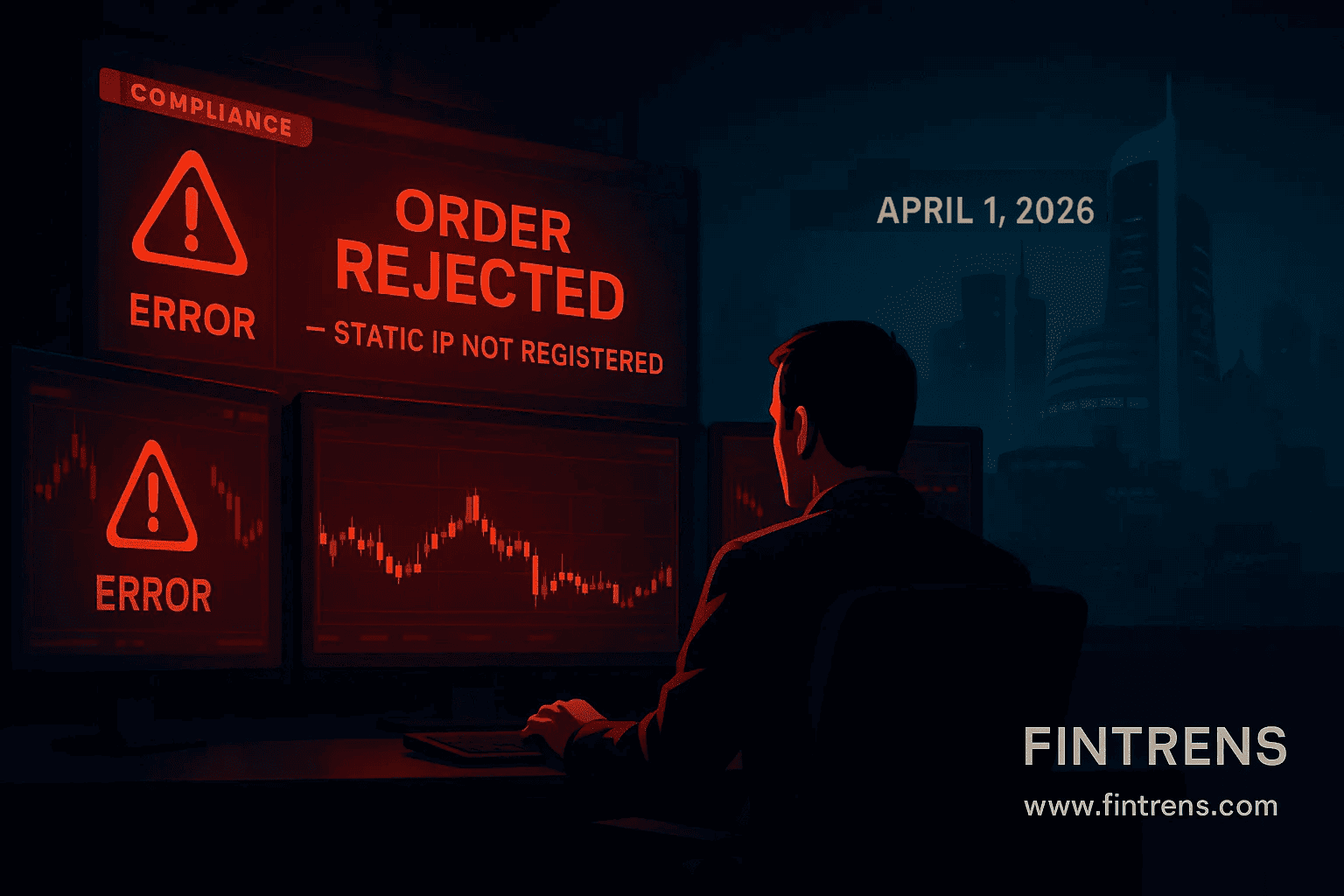URGENT: Your Algo Trading May STOP on April 1 2026 – NSE Static IP Mandate Explained

Starting April 1st, 2026, thousands of algo traders will see their orders automatically rejected if they haven’t complied with NSE’s latest mandate. static IP address registration for all trading algorithms, whether hosted on-premise or on cloud infrastructure. If you're a retail algo trader in India, understanding the right way to configure your static IP setup is now not just good practice — it's compliance.
Here’s everything you need to know in plain English to avoid trading disruption, ensure SEBI compliance, and protect your algo infrastructure from being shut down:
"How do I set up my static IP to comply with NSE 2025 guidelines?"
🌐 Understanding Static IP vs Dynamic IP (Rotating IP)
When you connect to the internet from your home broadband, mobile data, or even office WiFi, you are usually assigned a dynamic IP address. This IP changes frequently based on your network's configuration and service provider policies.
A static IP address, on the other hand:
- Remains constant over time
- Can be whitelisted with your broker (Zerodha, AngelOne, etc.)
- Is traceable and auditable as per SEBI and NSE guidelines
❌ Why Mobile Data or Rotating IP Won't Work
- Mobile internet uses carrier-grade NAT and rotating dynamic IPs
- These IPs cannot be pinned to a user or device permanently
- NSE circular explicitly mandates static IPv4 addresses, which means rotating IPs fail audit trail checks
If you're running your algo bot on mobile hotspot, normal broadband without static IP, or even VPN with dynamic exit nodes, your setup is non-compliant, and all brokers will automatically reject the order if the IP is not pre-registered and verified as static.
📁 IPv4 vs IPv6: What's Required?
| Protocol | Full Form | Bits | IP Format Example | NSE Requirement |
|---|---|---|---|---|
| IPv4 | Internet Protocol v4 | 32 | 192.168.1.10 | ✅ Required |
| IPv6 | Internet Protocol v6 | 128 | 2400:cb00:2048:1::c629:d7a2 | ❌ Not Accepted |
🧰 Why IPv4 is Mandated
- Brokers and audit systems rely on IPv4 for whitelisting
- NSE's network monitoring tools are built around IPv4 traceability
- IPv6, while technically advanced, is not yet standardised in trading infrastructure
So, when configuring your setup, always request a static IPv4 address, and avoid relying on IPv6, even if your ISP provides one.
🔎 Why Static IP is Mandatory for NSE Algo Trading
Under SEBI and NSE’s new algo regulations:
- Every algo trading application (local or cloud) must have traceable and auditable IP addresses.
- These IPs must be registered with the broker and mapped to the specific Client ID.
- You can declare two static IPs: one primary, one secondary.
This ensures better monitoring, audit trail and reduces chances of misuse or anonymity in automated trading systems.
✅ Static IP Setup Options: Local vs Cloud
Algo traders typically run their systems in two ways:
1. Locally Running Algos (On Your Laptop/Desktop)
- Ideal for low-frequency trading (under 10 orders per second)
- Use Case: Retail trader using Zerodha Kite API or AngelOne SmartAPI from a Windows or Linux system
- Static IP Recommendation:
- Register 2 Static IPs (Primary + Backup)
- Use 2 different broadband providers to avoid disruption
- Cost: ₹2,000 to ₹5,000 per year depending on your ISP
Leased Line Option
If you're a power user:
- Take a 10 Mbps Leased Line with static IP included
- Monthly cost: ~₹10,000
- High reliability and business-grade uptime
- Still keep a secondary normal broadband for failover
2. Cloud-Based Algos (VM Only — Not Serverless)
For simplicity and clarity, we are not covering serverless, Kubernetes, or Fargate setups. This is focused purely on Virtual Machine (VM) usage.
⚠️ Note: This blog excludes costs for managed databases, object storage, analytics, or other optional cloud services. Focus is kept strictly on VM pricing for static IP compliance.
Basic Cloud VM Setup:
- Use Case: Algo hosted on DigitalOcean, AWS, GCP, Azure
- NSE Guidelines:
- If below 10 OPS: Only 1 static IP required
- If above 10 OPS: Register 2 static IPs
Our Recommended Provider: DigitalOcean
- Free static IP with every VM
- Fixed monthly pricing (no surprises)
- 99.9% uptime SLA
- Easy VM maintenance
- Used by us for 8+ years with predictable billing
✨ Pro Tip: Don't delete your VM if you're using the same API key for your broker. Static IP is tied to the VM lifecycle.
Other cloud providers:
- AWS/GCP/Azure offer more features but include hidden charges (storage, egress, etc.)
- For those running backtests and large data loads, DigitalOcean offers simpler billing.
📊 Real Trader Compliance Snapshots
Here’s how actual traders are handling the compliance process:
🧑💼 Retail Zerodha User
- Setup: Locally hosted on laptop
- Connectivity: Dual broadband from Airtel and Jio
- Static IP Setup Cost: ₹5,000/year (combined)
- Broker API Config: Zerodha Kite – allows 2 IPs
☁️ Cloud VM AngelOne User
- Setup: Hosted on DigitalOcean VM
- Monthly Cost: $24/month
- Static IP: Free with VM
- Broker API Config: AngelOne SmartAPI – static IP whitelisting required
🧠 Multi-Broker Trader
- Setup: Algo engine pushing to multiple brokers
- Infra: Leased Line (₹10K/month) + fallback broadband
- Static IPs: Primary + Secondary registered across brokers
- Result: Fully SEBI-compliant with audit trail
🗓️ Compliance Visual Timeline
[July 2025] → [SEBI Circular Published]
[Aug 2025] → [APIs begin whitelisting]
[April 1, 2026] → ❌ Orders Blocked Without Static IP⚠️ Technical & Compliance Considerations
- As per NSE, static IPs must be traceable to the user (not shared across large groups)
- Using the same IP on two different brokers (e.g., AngelOne + IIFL) may go unnoticed by brokers but can be flagged by NSE
- VPNs/Proxy-based Indian static IPs:
- Technically acceptable
- But not recommended unless IP is traceable and auditable
- Monthly cost: ~₹500 or less
🔍 Summary: Choosing the Right Static IP Setup
| Scenario | Recommended Setup | Cost (Approx.) |
| Local Laptop Algo (<10 OPS) | 2 Static IPs from 2 ISPs | ₹4,000/year |
| Local + Leased Line | Leased Line + Normal Broadband | ₹10K/month + ₹4K/year |
| Cloud Algo (DigitalOcean) | 1 Free Static IP VM | $24/month |
| Cloud Algo (High OPS / Backup VM) | 2 VMs with static IPs | $48/month |
| VPN/Proxy Static IP (Not Advised) | Indian IP + Dynamic IP Network | ₹500/month |
🧾 API Configuration & Expiry Alert (Don't Ignore This)
❓ What if BSE Doesn’t Have This Requirement?
A common question traders ask is:
“Since only NSE has formally announced static IP requirements, can I trade on BSE without registering static IPs?”
The answer is still NO.
- Most brokers use a unified API infrastructure for both NSE and BSE.
- They do not maintain separate IP whitelisting setups for each exchange.
- If your static IP is not registered, your order will be rejected at the broker level, regardless of whether it is routed to NSE or BSE.
So, even if BSE hasn’t explicitly mandated it yet, you must still comply if you're using any algo trading API via your broker.
If you already have an existing API key from your broker that was created before static IP registration was introduced, you might wonder:
"Can I continue using the same API key without assigning a static IP?"
The answer is NO.
- As per the NSE’s retail algo trading compliance, existing API keys that do not have static IP binding will expire by April 1, 2026.
- After this date, only static-IP-mapped APIs will be allowed to place orders.
- Brokers are actively updating their portals and APIs to support static IP registration flows.
👉 If your broker doesn’t show a static IP configuration option yet, reach out to their API support immediately.
📈 Final Thoughts
🧠 Why This Regulation Actually Helps Retail Traders
While it may seem like an additional burden, this static IP requirement creates a level playing field and ensures accountability. It:
- Makes brokers responsible for IP mapping and security
- Deters manipulation from anonymous or high-frequency black-box systems
- Offers small retail traders a safe and transparent entry into algo trading
- This blog is kept beginner-friendly, especially for financial professionals
- If you have more complex infra (multi-cloud, serverless, VPC routing etc.), drop a comment below and we’ll assist
- All costs mentioned are approximate & subject to change. Additional services like databases, caching, object storage, or analytics tools are not included in this analysis. This blog is focused purely on static IP infrastructure for compliance.
At Fintrens, our flagship platform Firefly automatically supports SEBI-ready static IP configurations.
Explore Firefly’s documentation at docs.firefly.fintrens.com or Join Us to stay compliant.
✨ Disclaimer: Information shared is based on our usage and current policies. Always check with your broker and infrastructure provider for up-to-date guidance.




